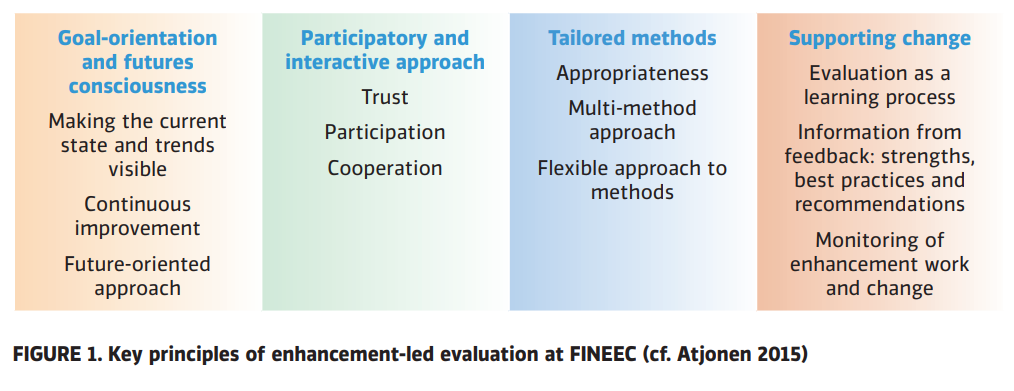Enhancement-led evaluation
Enhancement-led evaluation is an operating principle and the cornerstone of FINEEC's evaluations. The purpose of enhancement-led evaluation is to support the development of activities and promote change in the evaluation object. The prerequisite for development is the participation of the evaluation object. The organisation participating in the evaluation is actively engaged in the evaluation from the very beginning. This allows the organisation to develop its activities already during the evaluation process based on the feedback received and the information produced.
External experts with special knowledge of the evaluation topic are typically involved in evaluations in which the enhancement-led method is used. Joint discussions between the different parties, including education providers, teaching and other staff, students, employers and stakeholders, help to create an overall understanding of the evaluation topic.
The main purpose of enhancement-led evaluation is to develop activities and promote change in the evaluation object. The participation and engagement of the evaluation object and key stakeholder groups are emphasised in the enhancement-led methods.
In enhancement-led evaluation, both the evaluation process and results are of importance. The goal is that the organisation learns and develops its activities already during the evaluation process, not only after the results are published. The goal of enhancement-led evaluation is to support education organisations and early childhood education and care providers in developing their activities and highlighting their strengths, not just identifying shortcomings.
This purpose is achieved by drawing on the key principles of enhancement-led evaluation:
- interaction
- target group engagement
- learning
- positive approach and showing appreciation for the evaluation participants
- trust
- aiming for impact.
Enhancement-led evaluation is a value base rather than just a method.
Benefits of enhancement-led evaluation
Enhancement-led evaluation increases understanding of different actors’ perspectives and the theme evaluated through its interactive and inclusive approach.
The key purpose of enhancement-led evaluation is development, which prerequisite is that the evaluation participants are active and engaged in the development of their own activities. The evaluation supports the organisation in assessing its own activities and in identifying strengths and areas for improvement.
The approch also ensures the organisation’s commitment to the evaluation from the very beginning. This means that the organisation will presumably make more efficient use of the evaluation results and recommendations.
Enhancement-led evaluation produces recommendations that can be used locally, regionally and nationally alike when making decisions on the development of education.
Good practices, strengths and areas for improvement are shared in the evaluations. This allows organisations that have not taken part in the evaluation to also learn and develop their activities.
Enhancement-led evaluation is well established
Enhancement-led evaluation has been a key operating principle in Finnish education evaluation for over 20 years. Enhancement-led evaluation has been considered as such an essential foundation for evaluation activities of Finnish education that it is prescribed in the legislation on education evaluation.
“We found some of the enhancement-led evaluation methods of the audit so helpful that we intend to continue using them.” - Vice rector of a university of applied sciences
Enhancement-led evaluation in the international context
Using enhancement-led evaluation as an approach is not self-evident but a conscious choice that we have made in Finland. The way in which we conduct evaluations in Finland differs from methods used in many other European countries.
The Finnish enhancement-led evaluation approach and its methods attract a great deal of interest internationally. We have consequently also used the enhancement-led evaluation approach in several international cooperation projects and evaluations.

